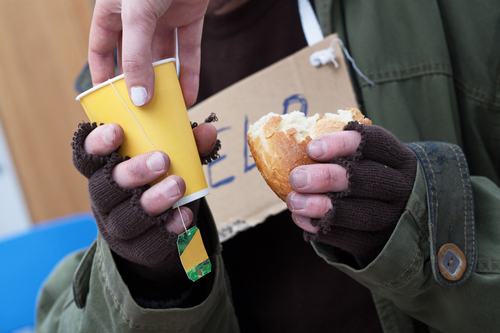 Like many cities, Fort Lauderdale’s homeless population has grown in recent years, resulting in a two very different reactions. One is an attempt to reach out to the homeless community and offer help, as exemplified by the weekly meals at Stranahan Park offered by a group calling itself Food Not Bombs. At the same time, there is a feeling of frustration from visitors and local businesses over some aspects of the increasing homeless population.
Like many cities, Fort Lauderdale’s homeless population has grown in recent years, resulting in a two very different reactions. One is an attempt to reach out to the homeless community and offer help, as exemplified by the weekly meals at Stranahan Park offered by a group calling itself Food Not Bombs. At the same time, there is a feeling of frustration from visitors and local businesses over some aspects of the increasing homeless population.
Cities are trying many different approaches to balancing the rights of the homeless and the rights of businesses and other citizens. In 2014, Fort Lauderdale enacted ordinances to limit activities of homeless people. One of these ordinances saddled organizations wishing to distribute food outdoors, such as Food Not Bombs, with restrictive regulations, effectively making it more difficult to offer free food to the homeless. Perhaps the idea was cut off the food supply and the numbers of homeless people will decline.
Food Not Bombs Fights Back
In 2015, Food Not Bombs sued the city, arguing that their regulations violated the group’s First Amendment rights of free speech and free association. Their case was initially dismissed when the federal trial judge decided the First Amendment didn’t apply, but they appealed that decision.
On August 23, 2018, the Atlanta-based 11th U.S. Circuit Court of Appeals reversed the trial court’s ruling, finding that Food Not Bombs’ public sharing of food with the homeless was indeed a form of expressive conduct and, therefore, absolutely protected by the First Amendment.
The appellate opinion was written by Judge Adalberto Jordan, a long-time participant in the annual First Amendment Seminar put on by the Florida Bar’s Media and Communications Law Committee. Because of Judge Jordan’s reputation as a well-regarded First Amendment scholar, the court’s opinion is likely to be well-received by other courts and cities struggling to find solutions to this difficult problem.
To explain why the appellate court overruled the district judge, Jordan used a wide range of examples of food sharing as expressive conduct – everything from “Jesus [sharing] meals with tax collectors and sinners to demonstrate that they were not outcasts” to Shakespeare to the first Thanksgiving – finding that it was the context of food sharing that made it fall under the First Amendment.
Essentially, Food Not Bombs was making a political and social statement by sharing food with the homeless in the park. Political speech enjoys the highest level of protection of all types of speech under the First Amendment.
What the Future Holds for Food Not Bombs
This does not mean that the nonprofit has won its case. Rather, it means that the case will be remanded to District Court, where the judge will have to accept the First Amendment argument and determine whether Fort Lauderdale’s ordinance actually violates the First Amendment or if it is unconstitutionally vague.
But it just goes to show the potential power of the First Amendment. If you have a case related to your First Amendment rights, reach out to the Marks Gray Media and First Amendment Law team. I frequently advise and represent clients on First Amendment matters and would be honored to assist you as well.